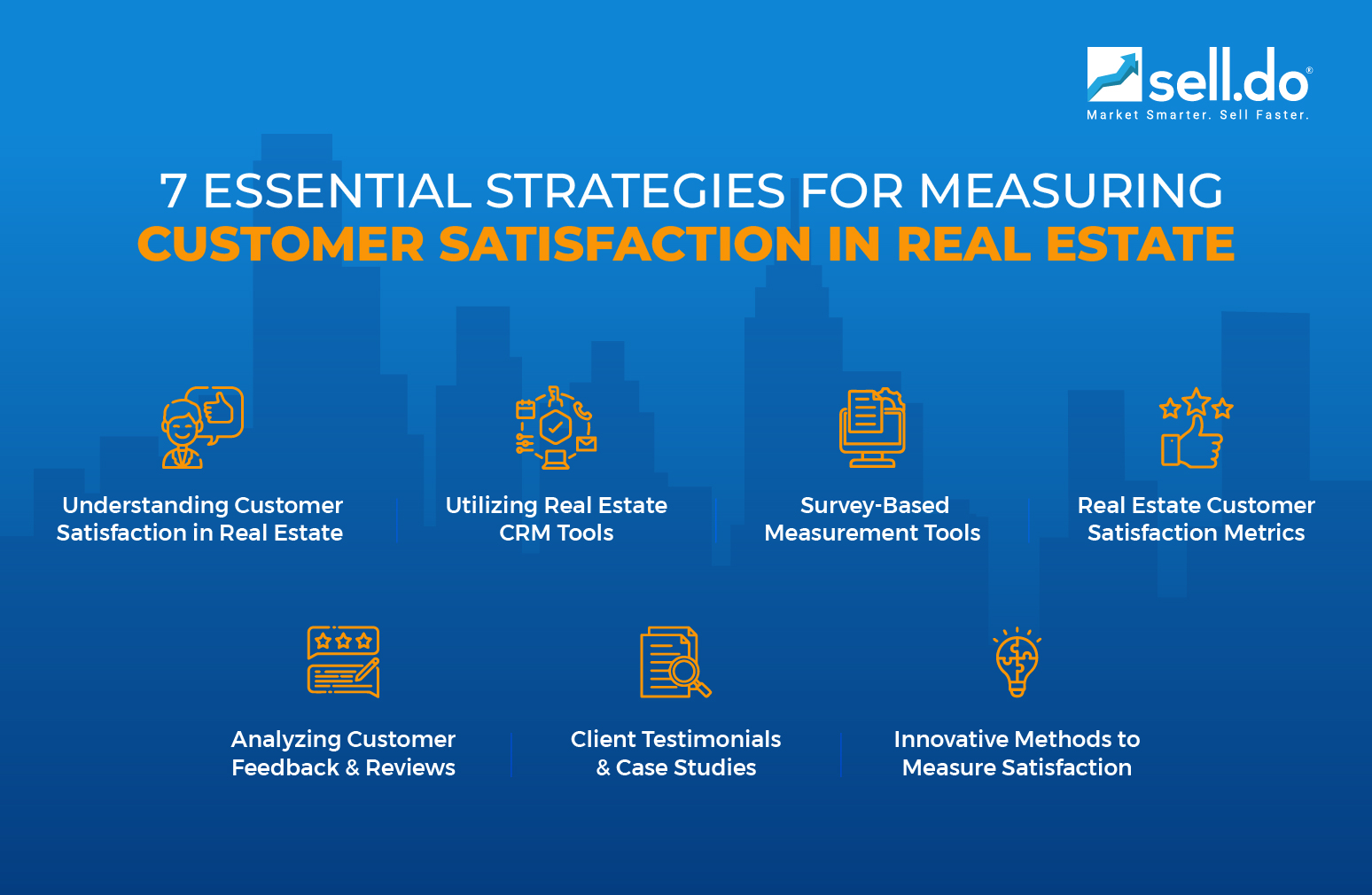Introduction:
In the highly competitive realm of real estate, customer satisfaction is paramount. It not only determines the likelihood of repeat business but also significantly enhances the rate of referrals, which are crucial for sustaining and growing a business in this sector. This comprehensive blog dives deeply into a variety of effective tools and strategies meticulously designed to measure and improve customer satisfaction. These tools and strategies are essential for nurturing client relationships and propelling business success forward.
Understanding how satisfied clients are with the services provided can transform a real estate business from merely functional to highly recommended. By focusing on customer satisfaction, real estate professionals can lay a robust foundation for loyalty, which in turn fosters a reliable stream of referrals and establishes a solid reputation for excellence in a fiercely competitive market. This commitment to customer satisfaction is not just about addressing client needs but also involves a continuous process of assessing and enhancing every facet of the customer experience.
The aim is to consistently deliver superior value and exceed client expectations, thereby ensuring that each client interaction contributes positively to building long-term relationships.
Through the strategic implementation of these measures, real estate professionals can effectively turn satisfactory client interactions into lasting business success, creating a virtuous cycle of client satisfaction, referral generation, and business growth. This approach not only benefits the business in terms of increased profitability and market share but also enhances the overall health and reputation of the brand in the real estate industry.
Strategies for Measuring Real Estate Customer Satisfaction

-
Understanding Customer Satisfaction in Real Estate:
Customer satisfaction in real estate refers to how well the services provided meet or exceed the expectations of clients. It's a crucial metric that influences both the reputation and sustainability of a business. Measuring customer satisfaction is essential as it helps in identifying areas of improvement and in implementing strategies to enhance service quality. Understanding the level of satisfaction of clients after a transaction can provide invaluable feedback, which can be used to refine marketing strategies, customer service protocols, and the overall client interaction process.
-
Utilizing Real Estate CRM Tools:
Real estate CRM tools like Sell Do and other best CRM for real estate solutions are instrumental in managing client interactions and feedback. These tools offer comprehensive features that track all communications and transactions, providing real-time insights into customer behavior and satisfaction. For example, integrating CRM data can help real estate professionals understand buying patterns, client concerns, and overall satisfaction levels, thereby enabling personalized service delivery. This tailored approach can significantly enhance client relationships, leading to higher satisfaction rates and increased loyalty.
-
Survey-Based Measurement Tools:
Surveys remain one of the most direct methods for measuring customer satisfaction in real estate. They can be deployed post-sale or post-rental to gather feedback on various aspects of the service received. Crafting effective surveys involves asking clear, concise questions that encourage honest feedback, thereby yielding more accurate and actionable insights. The design of these surveys should be aligned with the specific objectives of the feedback session, ensuring that the questions are structured to provide clear and measurable data that can be analyzed to improve service offerings.
-
Real Estate Customer Satisfaction Metrics:
Important real estate customer satisfaction metrics include Net Promoter Score (NPS), Customer Satisfaction Score (CSAT), and Customer Effort Score (CES). These metrics help quantify how satisfied clients are with their service experience, providing benchmarks for evaluating performance and client loyalty. Each metric offers a different insight into the client experience, from their likelihood to recommend the service to others, their overall satisfaction with the service, and the effort they had to expend to get their issues resolved.
-
Analyzing Customer Feedback and Reviews:
Social media and online platforms are vital for capturing unsolicited customer feedback. Analyzing this feedback involves sorting through comments and reviews to identify common themes and areas for improvement. This process helps understand customer sentiment and make informed decisions to enhance service quality. Regular monitoring and analysis of online feedback can help real estate businesses stay ahead of potential issues and proactively address client concerns.
-
Client Testimonials and Case Studies:
Client testimonials and case studies are powerful tools for demonstrating satisfaction and building trust with potential customers. They provide real-world evidence of a company’s ability to meet client needs and adapt based on feedback, showcasing the company’s commitment to continuous improvement. Detailed stories and examples of successful client interactions can serve as a testament to the company's dedication to delivering high-quality services and its capacity to meet various client demands.
-
Innovative Methods to Measure Satisfaction:
Emerging technologies like AI analytics are revolutionizing how businesses understand client behavior and satisfaction trends. Additionally, virtual reality tours offer a novel way to engage clients during the pre-purchase phase, significantly enhancing their decision-making experience and satisfaction. These innovative tools provide a more interactive and immersive experience, allowing clients to explore properties in detail, which can lead to a higher level of satisfaction and a more informed buying decision.
The importance of measuring customer satisfaction in real estate is immense and cannot be overstated. Utilizing sophisticated real estate CRM tools like Sell.Do can significantly enhance this process. Sell.Do is specifically tailored for the real estate sector, enabling professionals to meticulously track and analyze every customer interaction and feedback. This system provides real-time insights that are vital for understanding client needs and improving service offerings.
By integrating tools such as Sell.Do, real estate professionals can streamline their processes to better manage client relationships. This CRM tool helps in segmenting customer data, automating communications, and monitoring sales progress, which in turn facilitates a deeper understanding of customer satisfaction metrics. Such capabilities are crucial for customizing services to meet the specific expectations of clients, thereby enhancing overall satisfaction and loyalty.
Furthermore, the comprehensive analytics provided by Sell.Do allow businesses to pinpoint strengths and areas needing improvement through detailed reports and dashboards. This ongoing evaluation is key to continuous service enhancement, ensuring that client relationships are not only maintained but also strengthened over time.
Ultimately, a strong focus on customer satisfaction, aided by advanced tools like Sell.Do, translates into significant business benefits. Satisfied clients are more likely to engage in repeat business, provide positive referrals, and contribute to a favorable reputation in a competitive market. Thus, by prioritizing and effectively measuring customer satisfaction with the support of Sell.Do, real estate professionals can not only improve their client relations but also drive substantial business growth.
Conclusion:
Leveraging Sell.Do and other advanced real estate CRM tools is pivotal for real estate companies aiming to excel and expand in today’s market. Implementing these measures is crucial for adapting to customer needs, improving service delivery, and securing a thriving future in the real estate industry.






Leave a comment
Comments (0)
Be the first one to comment.